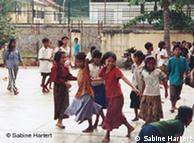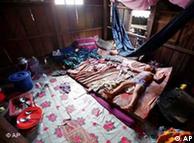Human Rights | 30.03.2010
Cambodian slum dwellers forced out of their homes
It is pouring rain on this settlement half an hour away from Phnom Penh. Makeshift shacks have been assembled from plastic sheets and boards. There are kerosene stoves and old mattresses. It reeks of urine and feces. There are loads of kids running around.
"We’re not here out of choice," says Od Jah, who is soaking wet and sitting in front of her shack. "We had a good house in Dey Krahom district on the Tonle Sap River," adds the 25-year-old mother of six.
However, a company wanted to build a shopping center and apartments in Dey Krahom. It tried to persuade the inhabitants to leave the houses that they had built 20 years before; however, they refused to leave.
Forced evictions
In January 2009, the families were evicted by force. Manfred Hornung, a German who works with LICADHO, the Cambodian League for the Promotion and Defense of Human Rights in Phnom Penh explains what happened: "At about two in the morning, police units came and cordoned off the area. Then at about six, they started pushing the people to make way for the workers employed by the company that wants the land for itself.
"The workers tore down the houses, using heavy machinery too. The police kept control. Most of the people had no time to get their personal belongings from their houses. Many of them lost everything, including their papers."
Chin Lydha, a lawyer who works for LICADHO, says the evictions are illegal. He is angry that the slum dwellers were not warned in advance so that they could at least collect their things. "They did not inform people so that they could move by themselves and they just used an administrative measure to evict them without having a court decision."
No support from the courts
The evictions of the Dey Krahom district are not an isolated incident. About 40,000 people have been evicted since 2003 in Phnom Penh alone – usually to make way for private construction projects. Whole families are often affected, says Manfred Hornung, and there is little regard for the law.
 Bildunterschrift: Großansicht des Bildes mit der Bildunterschrift: Children bear the brunt when families are forced to move and sometimes have to forego schooling
Bildunterschrift: Großansicht des Bildes mit der Bildunterschrift: Children bear the brunt when families are forced to move and sometimes have to forego schooling
"Under Cambodian agricultural law, people have very strong ownership rights. But these are never seen as individual cases. These areas are always cleared by force on a large scale. It is a very serious problem."
Chin Lydha says that people cannot turn to the courts because they are corrupt and biased. "This is the main problem of the Cambodian judiciary system. The courts are not fully independent. The rich and the powerful can interfere, using the court as a way to put pressure on people who have land."
He adds that the courts usually back the companies, permitting them to use violence to evict families from their homes or destroy properties.
Back at the miserable settlement outside Pnomh Penh, Od Jah, the young mother of six, uses rainwater to cook with. She explains that her husband works on a building site 30 kilometers away. He goes there every Monday and comes back on Saturday with a few dollars. He sleeps on site because he cannot afford to commute by moped taxi.
Author: Thomas Kruchem / act
Editor: Thomas Baerthlein

沒有留言:
張貼留言